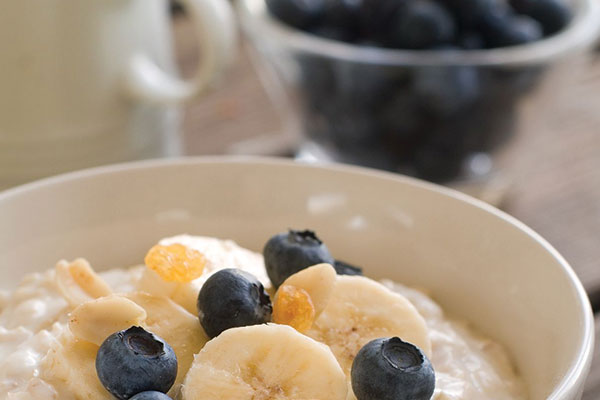Get Your Digestive Tract Back on Track
Tips for Coping with Cancer-Related Gastrointestinal Complications
by Marie Morande, RD, CSO, LD
No matter what type of cancer treatment you receive – radiation, chemotherapy, or surgery – all of them pose potential side effects. And some of the most common side effects involve the gastrointestinal tract, also called the digestive tract. Cancer treatment can affect your body’s ability to absorb food, and can cause disruptive gastrointestinal issues. These gastrointestinal complications may include nausea and vomiting, diarrhea, constipation, and sore mouth.
Nausea and vomiting
Can affect your nutritional intake during treatment. It’s important to keep them under control. Anti-nausea medications can help you manage cancer-related nausea and vomiting. Talk to your doctor for specific recommendations.
Dietary changes can also be helpful. Eat small, frequent meals of easily digestible foods. For example, crackers, pudding, yogurt, sherbet, fruits, rice, baked chicken, sandwiches, oatmeal, and broth-based soups. Certain spices, particularly ginger, cinnamon, allspice, cardamom, cloves, fennel, and mint, are considered stomach soothers and may also help with nausea and vomiting. Avoid cooking foods that produce strong aromas. And stay away from spicy or greasy foods.
Another thing you can try is acupressure bands. These bands apply pressure on the wrist to stimulate an acupuncture point that practitioners believe may help stop nausea and vomiting. Though typically used to alleviate motion sickness, these bands may also help ease cancer-related nausea.
Diarrhea
Which is defined as a change in the consistency or frequency of your stools, may force you to stay home and limit your activity, decreasing your quality of life. The standard treatment for diarrhea is loperamide, but other medications are available. Your doctor can help you find the one that works best for you.
Your diet also plays a role in managing diarrhea. Eat a low-fiber, lactose-restricted diet by avoiding raw vegetables (like broccoli and cauliflower), salad, bran, skins of fruit, and high-fiber cereals, and limit dairy products containing lactose. Soluble fiber like psyllium may help control diarrhea by bulking the stool. Probiotics may help with diarrhea as well. If you’re experiencing frequent diarrhea, eat foods that are high in salt and potassium, or drink electrolyte-enhanced drinks, to replace the electrolytes your body is losing.
Constipation
is a common side effect of cancer treatments. Anti-nausea and opioid pain medications may also cause constipation. To prevent constipation, it’s important to begin a daily bowel care program when you start cancer treatment. Although the exact regimen will vary by person, experts recommend starting with a stimulant laxative and stool softener, and then adjusting as needed per your doctor’s recommendation.
In addition, eating a high-fiber diet can help manage constipation. High-fiber foods include fresh fruit, dried fruit (like prunes), raw vegetables and salads, and multigrain goods. Wheat bran is especially helpful. Wheat bran, which is often found in bran cereals, can be added to other cereals, muffins, yogurt, and soups. It’s also important to increase your fluid intake, and drinking hot beverages (like senna tea or green tea) may be especially helpful.
Mucositis
is inflammation of the lining of the gastrointestinal tract, usually caused by chemotherapy or radiation therapy. Oral mucositis refers to inflammation and ulceration of the mouth. Preventing and treating oral mucositis starts with good mouth care. Brush your teeth with a soft-bristle toothbrush, and routinely rinse your mouth with a bland mouthwash or rinse.
No single rinse has been found more effective than another in preventing mucositis; however, a baking soda or salt rinse is a common and economical option. To make at home, mix one teaspoon of baking soda or salt with one pint of water. Rinse your mouth with one tablespoon of the solution for thirty seconds, and then spit out the mixture. You should do this four times each day.
If you’re starting fluorouracil or melphalan infusions, you may find that sucking on ice chips for 35 minutes during the infusion may help reduce oral mucositis. However, avoid ice if you are taking drugs that can increase cold sensitivity, such as capecitabine or oxaliplatin. Aloe vera, honey, and glutamine may also help to reduce the severity of mucositis.
If you have mucositis, eat bland, soft, and moist foods. You can try nutrition supplement drinks, homemade protein shakes, and bananas, as these are all nonirritating, nutrient-dense foods. Avoid spicy foods, citrus, and dry or coarse foods that may irritate your mouth until your mucositis heals.
Ask your doctor about the side affects you should expect from your course of treatment. Your doctor can help you develop a plan to minimize gastrointestinal side effects while maximizing nutrition and fluid intake.

Marie Morande is a certified specialist in oncology nutrition at the Lynn Cancer Institute in Boca Raton, FL, and a member of the Oncology Nutrition Dietetic Practice Group of the Academy of Nutrition and Dietetics.
This article was published in Coping® with Cancer magazine, March/April 2017.


